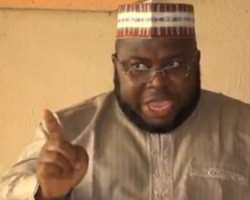Ex-militants' war threat is unacceptable – Punch

Taking impunity to a new level, some ex-Niger Delta militants, joined by some intemperate public officials, gathered in Yenagoa, the Bayelsa State capital, last week to declare war against Nigeria in advance, should President Goodluck Jonathan lose next month's presidential election. While disdain for law and order is not totally unexpected from pardoned ex-insurgents, the participation of Governor Seriake Dickson and a presidential adviser, Kingsley Kuku, in that provocative conclave is doubly unacceptable and should warrant a response from the government.
The bravado was shocking. According to news reports, the ex-militants, featuring some ex-warlords, vowed to take up arms against the country if Jonathan lost the February 14 presidential election. They also threatened reprisals for attacks on the President's campaign team and vehicles in some northern states. Asari Dokubo, who has repeatedly trodden this path, urged attendees to get ready for war: 'This action is calling the Niger Delta youths to war.'
Like him, others, including Government Ekpemupolo, aka Tompolo, and Victor Ebikabowei, aka Boy Loaf, vowed to disrupt oil production. 'If they take the power away from Jonathan, we will take our oil,' declared Ebikabowei. If the threats of persons who once violently resorted to self-help were disturbing, the benevolent presence of Dickson and Kuku was alarming.
Rather than moderate the extremism on display, Dickson, playing the amiable host, reportedly thanked the speakers for 'backing the re-election of President Jonathan with greater vigour' and promised to relate their position to him. On his part, Kuku, the President's Special Adviser on Niger Delta Affairs and Chairman of the Amnesty Implementation Committee, reportedly read the resolutions of the meeting, reiterating that the region's youths would not take attacks on the President's campaign entourage lightly.
If these reports are a true reflection of what transpired, Dickson's and Kuku's actions were simply treasonable. They have desecrated the high offices they occupy. Dickson imprudently provided the hallowed chambers of the Government House, Yenagoa, for the infamous meeting and lent the imprimatur of his exalted office to threats against the country and the 1999 Constitution that he solemnly swore to uphold.
Most offensive is the complete disregard for law and the electoral process. The militants did not hinge their angst on any universally acceptable present or future injustice to their preferred choice for president. Rather, they demonstrated utter disregard for the electoral process, vowing to declare war and disrupt oil production even if Jonathan lost in a free and fair contest.
This arrogance is insufferable and the rest of Nigeria should be concerned. First, leaders, elders, traditional authorities and even the youths of Ijawland, on whose behalf the incendiary threats were purportedly made, should come out to disclaim the preposterous provocation. It is an ill-wind that benefits no one, certainly not the 14 million population claimed by the Ijaw Foundation.
Jonathan should not play the ostrich on this one. The threat is too weighty to be ignored, especially with the presence of his aide, Kuku, at the meeting. He should not forget this statement that 'nobody's political ambition is worth the blood of any Nigerian.' Nigerians have risen as one against mindless, unprovoked violence or threats by any group. When misguided youths rampaged in some northern states after the 2011 presidential election, they received national and worldwide condemnation. His silence can only be interpreted as tacit agreement. Did he send Kuku to the meeting or was the adviser there in his personal capacity? No presidential adviser or state governor ought to be associated with such threats.
The central pillars of democracy are the rule of law and regular free and fair elections. Jonathan won one in 2011; he can remain in office for another four years only through another electoral victory. You neither go to war when your candidate loses an election nor declare war ahead of it.
The misguided militants forget that the votes of the Ijaw militants alone cannot secure election and Nigeria is a single constituency for an aspirant to the presidency. Jonathan won handily across the country in 2011. He fortuitously ascended the presidency, first, as Acting President, not by the actions of his kinsmen, who also played no role whatsoever in his nomination to the vice-presidency in 2007.
It is tragic that ex-militants, once accused of kidnapping, sabotage of oil facilities and killing of soldiers and policemen but were granted amnesty by the late President Umaru Yar'Adua, are once again threatening violence on the basis of a divine right to the Presidency. A media report published in February 2014 estimated that at least N260 billion was spent on ex-Niger Delta militants between 2009 and 2013 through amnesty payments and lucrative pipeline protection deals, while N35.8 billion was voted for ex-militants in 2014. Ekpemupolo's company has been awarded a controversial multimillion dollar coastal protection contract just as Asari Dokubo, Ebikabowei and others also have been given contracts.
Thousands have received scholarships and monthly payouts.
Two years ago, Kuku had, during a visit to the United States, similarly threatened war if Jonathan was not returned to office in 2015. Asari Dokubo has been making the same threat for years with no response from the President. Nigerians can no longer accept silence from their President, whose then political adviser, Ahmed Gulak, reacting to yet another threat of violence from Asari Dokubo in 2013, said the ex-militant was merely expressing his own opinion.
The militants make no pretence to being well-armed. In any case, their security contracts enable them to legally procure sophisticated weapons, funded by the taxpayer, and immense wealth to buy more outside official channels.
The inaction of the Department of State Service and the police is baffling, but may not be unconnected with their reading of the president's body language. Jonathan should not allow his ambition and supporters to plunge Nigeria into a blood-soaked crisis. The security agencies should shun partisanship and do their duty to the state by taking counter-measures against any violent threats to the country.
